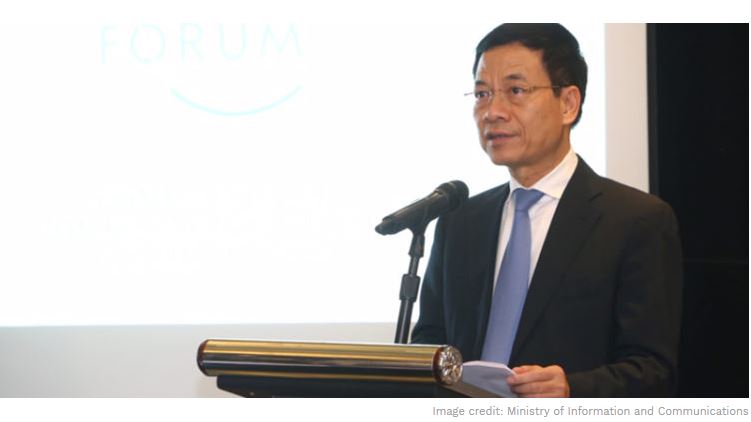Digital ASEAN initiative has opportunities for Vietnam’s digital economy
The Association of Southeast Asian Nations (ASEAN) Digital Conference was held by the World Economic Forum (WEF), earlier this week. The WEF is the international organisation for public-private cooperation.
Speaking at the conference, the Vietnamese ICT Minister, Nguyen Manh Hung, said that Digital ASEAN will create new strength for Southeast Asia and bring the allied nations closer. Digital transformation generates better opportunities for developing countries.
According to the WEF, ASEAN is the world’s fastest-growing Internet market. With 125,000 new users coming onto the Internet every day, the ASEAN digital economy is projected to grow significantly, adding an estimated US $1 trillion to regional GDP over the next ten years.
The Digital ASEAN initiative is WEF’s response to demand from the Forum’s regional partners in ASEAN, both public and private. The initiative aims to work on the issues that will underpin a regional digital economy in ASEAN so that the benefits of Industry 4.0 can be fully unlocked and become a force for regional economic inclusion.
A press statement, released by the Ministry of Information and Communications (MIC), said that ASEAN countries will take advantage of this opportunity to develop their digital economies. For Vietnam, a digital economy will play a key role in increasing labour productivity and promoting economic growth and the country’s competitiveness.
It stated that technologies have changed the way the world lives. However, people and the government do not change as fast as technology does; this is the country’s biggest challenge. Therefore, it must train human resources to adapt to change.
WEF noted that the Digital ASEAN initiative comprises a portfolio of five workstreams centred on the following focus areas:
- Pan-ASEAN Data Policy: shaping a common regional data policy
- ASEAN Digital Skills: building a commitment to train digital skills for the ASEAN workforce
- ASEAN e-Payments: building a common ASEAN e-payments framework
- ASEAN Cybersecurity: nurturing cooperation and capacity building in ASEAN cybersecurity
Four task forces have been established, one for each of the four focus areas. Members of task forces represent a multi-stakeholder group from the private sector, ASEAN governments, international organisations, regional organizations, and academia.
Sitting above these task forces is a Board of Advisors, whose role is to guide and shape the portfolio of work. The Board of Advisors includes individuals who are ASEAN Ministers of Digital Economy, ICT, and Commerce, and business leaders.
MIC’s release stated that along with tech giants like Microsoft and Google, the VNG Corporation (one of Vietnam’s largest technology companies) and 13 other businesses are committed to participating in the ASEAN Digital Skills Vision 2020.
Launched in 2018, the ASEAN Digital Skill Vision 2020 is the WEF’s cooperation program. It aims to train more than 20 million workers, raise US $2 million worth of scholarship funds for students, and create jobs for over 200,000 digital workers of small and medium enterprises in Southeast Asia.
It will build a collective pledge on hiring and/or training not only workers but also the wider eco-system of consumers and users of digital services (such as SME traders), as well as digital regulators in the ASEAN region, WEF said.
The pledge consists of the following specific commitments to be achieved by 2020:
- Train 20 million workers at ASEAN SMEs;
- Raise US $2million in contributions to providing scholarships for ASEAN technology students;
- Hire directly 200,000 ASEAN digital workers;
- Engage 20,000 ASEAN citizens through “Digital Inspiration Days”;
- Offer 2,000 internship opportunities for ASEAN university students;
- Train 200 ASEAN regulators;
- Contribute to shaping the curricula at 20 ASEAN universities; and
- Train 40 million ASEAN individual citizens in digital literacy and online safety.
Source: https://www.opengovasia.com/digital-asean-initiative-has-opportunities-for-vietnams-digital-economy/


 Thailand
Thailand




